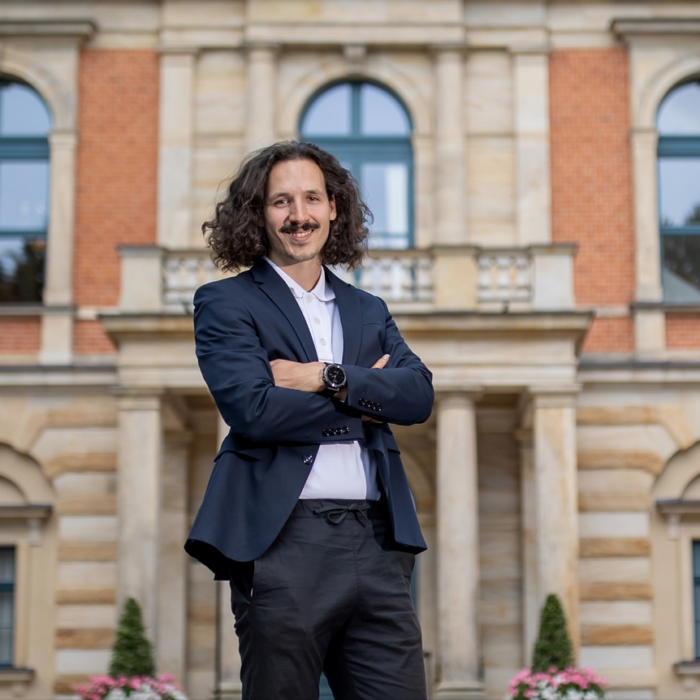
Q & A: Sebastian Catana on the Teatro Carlo Felice, ‘Pagliacci’ & Verismo
By Francisco SalazarOn Oct. 8, Sebastian Catana made his long-awaited Teatro Carlo Felice debut in “Pagliacci.”
The debut saw the Romanian baritone perform the role of Tonio for the second time, following an acclaimed role debut at the Arena di Verona this past summer. The debut also marked the Teatro Carlo Felice’s reopening and “rebirth.”
Catana, who has performed throughout Italy, spoke to OperaWire about his debut, the role of Tonio in “Pagliacci” and his love of Verismo music.
OperaWire: Tell me about Tonio, how do you view this character? he is cruel, and he even tries to force himself upon Nedda. Can you identify with this character?
Sebastian Catana: Tonio is a fascinating character in the sense that he presents a lot of facets of the human soul. Of course, he sings the famous Prologue but besides that, he sings a lot of interesting music throughout the opera, especially during the duet with Nedda. I see Tonio as one of these complex characters, a man that has lived on this long journey with Canio, Nedda, Beppe, and the other members of this touring group. He is someone who has grown up in this environment and probably at a very early age found refuge in it from a tough upbringing that involved abuse, neglect, loneliness, and a certain handicap. I always try to find motivations for the actions of each character that I perform, even if these motivations are not clear from the text and the music of the opera.
Tonio is cruel but his cruelty comes out only after he gets rejected for the love he feels for Nedda as he opens up maybe for the first time in his life. In the beginning, he is shy, awkward, and somewhat strange but as he feels rejected, he becomes vindictive and downright evil. His life suddenly turns dark. It is also interesting to see and hear Tonio during the “commedia” where he is interpreting the character “Taddeo,” a new part for him where he clearly feels at ease and free of any complexes and fears that he would feel in his day-to-day existence, doing something that he enjoys and excels at.
In this production, Tonio is present on stage a lot more than usual as the true manipulator and instigator of the drama. He becomes almost a Iago-like figure in the context of the brutal ending of the opera. He fittingly recites the fatal words “La commedia è finita!” as indicated by Leoncavallo.
OW: What are the biggest challenges of performing the role and what is your favorite moment in the opera?
SC: I think the biggest challenge of performing a role like Tonio is not to think and try to “make” him evil from the beginning, but to create a more nuanced and gradual approach that conveys him as real and true. If you fall into the trap of just creating an evil character from the first moment you walk on stage, you are in danger of losing credibility and becoming caricatural, something that should be avoided at all costs especially in a verismo opera.
My most favorite moment is of course the famous Prologue. Singing it is always a thrill given the unbelievable beauty of the music and its message that basically describes the life and soul of the artist. It is a remarkable moment and to start the evening with such a piece is always a responsibility and a beautiful challenge.
OW: Leoncavallo is a Verismo composer, and you sing a lot of Verdi. How does the verismo style compare to the more bel canto approach of Verdi?
SC: I see verismo as a natural evolution from the operas of Giuseppe Verdi and his bel canto predecessors. If you listen to all the great Italian baritones of the early and mid-1900s, you can hear and feel that they sing with the same sense of legato and line in their verismo roles as they use for Verdi and bel canto. Verismo operas and in particular “Pagliacci” are orchestrated heavier than any earlier Verdi opera with a special emphasis on the text that must be enunciated with clarity and nuance.
Interpretation and acting are crucial for any verismo work but cannot be exaggerated with unnecessary “cheap” effects as composers clearly indicate which parts should be “spoken” in parlando and such moments should not take over the performance.
OW: You recently sang this opera at the Arena di Verona for the first time. Tell me about the first time doing this role and what have you learned about it since this past summer?
SC: As you mentioned, my debut for the role of Tonio took place this summer in the new production of “Cavalleria Rusticana/Pagliacci” at the Arena di Verona. It was initially scheduled for the opening of the 2020 Festival in Verona but because of the COVID-19 pandemic, it got rescheduled for this past summer. Therefore, I had a lot of time to prepare for this role, vocally, musically, and from an interpretative point of view using all these months for very intense work on it with my teacher and coaches.
Still, as prepared as I was, I could not hide the emotion felt when singing it for the first time on the majestic stage of the Arena di Verona. It was an evening that I will never forget, being the first time back on stage after many months of doubts and fears as we all artists experienced during this worldwide pandemic. It was very emotional and special.
OW: Tell me about working with Fabio Sartori and Serena Gamberoni? How has the collaboration been?
SC: It has been truly wonderful working with Fabio Sartori and Serena Gamberoni, both of them being amazing artists that I greatly admire but with whom I have not gotten the chance to work with until now. Actually, we were supposed to sing “Pagliacci” with Fabio this past summer in Verona but unfortunately that evening the weather was not cooperating because of storms throughout the night and thus the performance got canceled.
It is great to reunite and sing in Genova next to Fabio and also Serena while creating our characters together, combining our artistry, and building that trust needed to make true and memorable performances.
OW: Tell me about this production and what new elements it brings to the opera? How does it differ from the production you did at the Arena di Verona?
SC: The production in Genova directed by Cristian Taraborrelli uses an innovative approach of so-called “augmented reality” where different scenes are filmed before and/or during the performance and shown on an upper HD screen as a tool to create rich imagery for the spectator and at the same time to enhance the emotional state of each character on stage. In that sense, the production is much more intimate as the public experiences the thoughts of a character not just through music and text but also through images. Since the chorus is not present on stage during the opera because of COVID-19 precautions, each character receives additional focus and development. Tonio is present on stage almost throughout the opera becoming the mastermind of the entire tragedy that occurs in the end.
While the production at the Arena di Verona was grandiose and spectacular, the one in Genova will be just as impactful I think, using new technology for detailed characterization.
OW: This will be your debut in Genoa. What does this debut mean to you and why is this house special?
SC: Genoa is one of the great Italian cities that has a rich cultural history with the Teatro Carlo Felice occupying a high place among the great Italian opera houses. I am overly excited to be part of the so-called rebirth of this important theater after the pandemic pause of many months and especially being invited for the first time for such an important project. I have been so impressed with the quality of the orchestra and chorus of Teatro Carlo Felice and everyone working behind the stage.
I would like to use this opportunity to thank Sovrintendente Claudio Orazi and Artistic Director Pierangelo Conte for their extraordinary work to make this project possible and their support for all of us artists during this intense period.
OW: You have sung in Italy before. What are the biggest challenges of singing in this country especially in an Italian opera that audience members love so much?
SC: Singing in Italy is always an immense pleasure and great honor. I see singing Italian opera in Italy as a responsibility to audiences that are very knowledgeable and extremely passionate about these works. It is wonderful to experience this passion for Italian opera and its amazing history everywhere I get to perform in this country.
WO: This production will be televised. What excites you about this opportunity and about having this production being preserved?
SC: I think the most exciting and important part of having this production televised is being able to reach a wider audience. In our days, opera has become a universal art form through different mediums like TV and social media where performances are easily accessible and thus communication between the artist and the public has fewer barriers. We as artists are always grateful to have our portrayals of different roles preserved for future audiences and hopefully be part of maintaining our art form alive and thriving!


